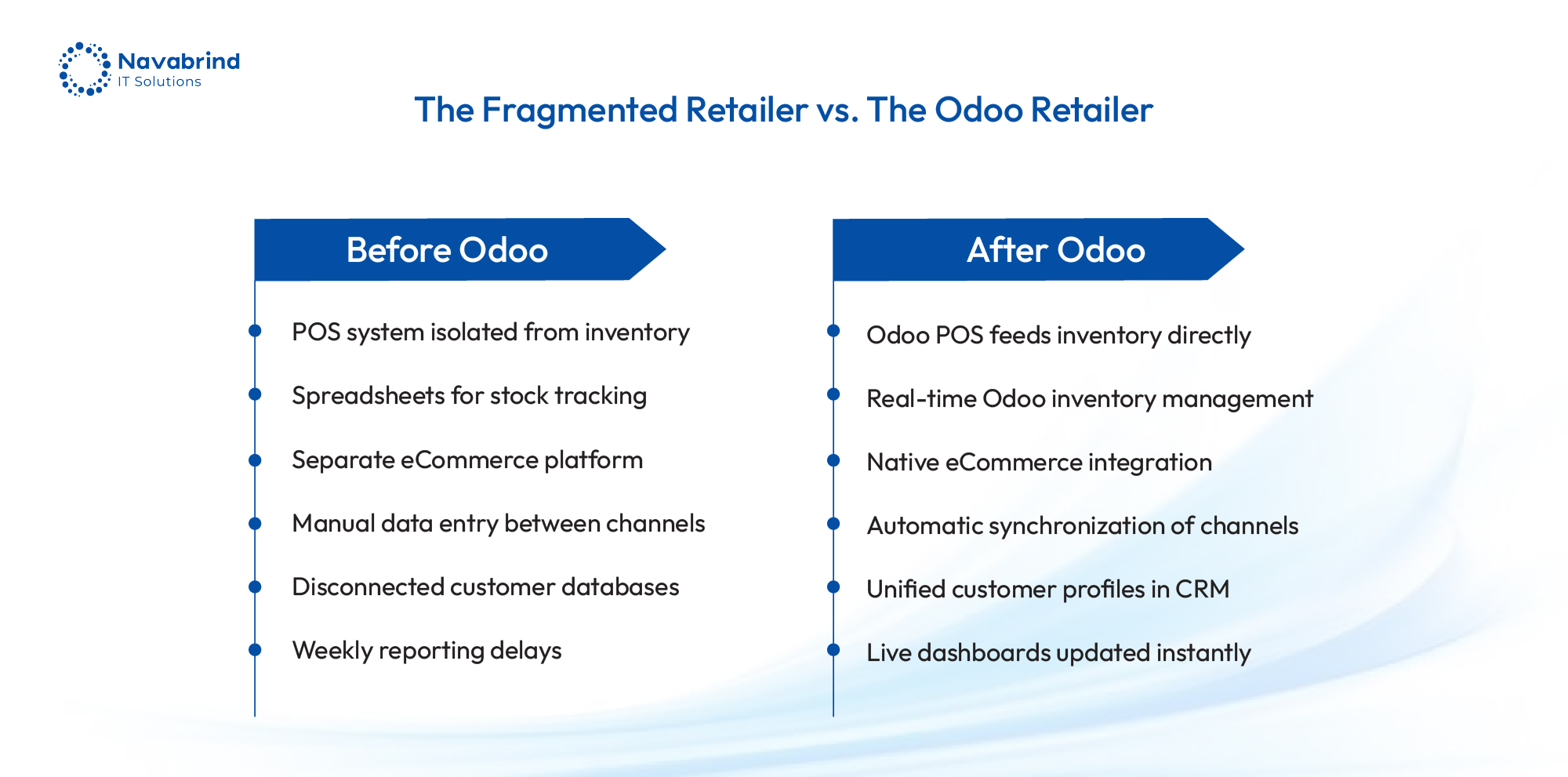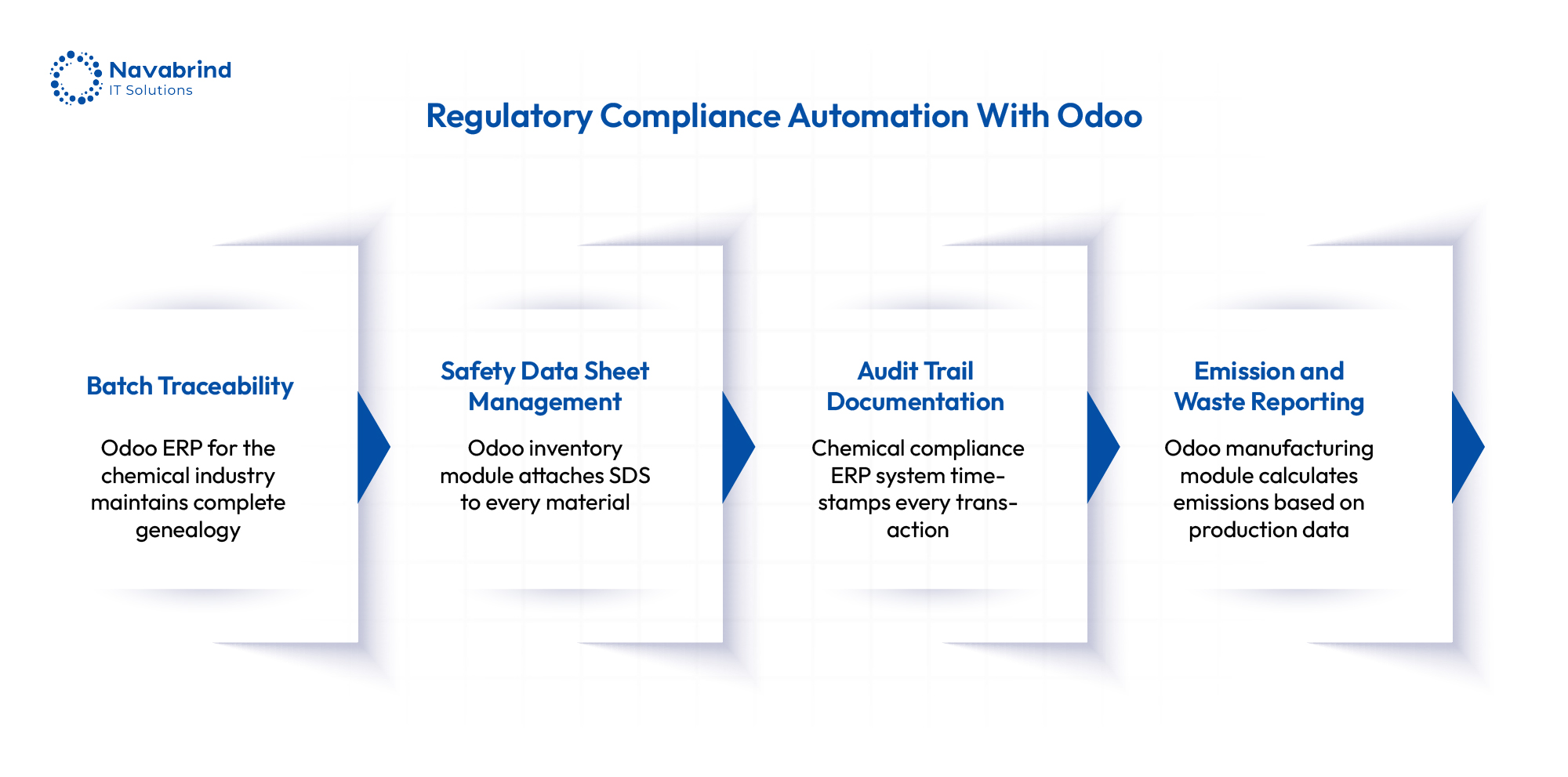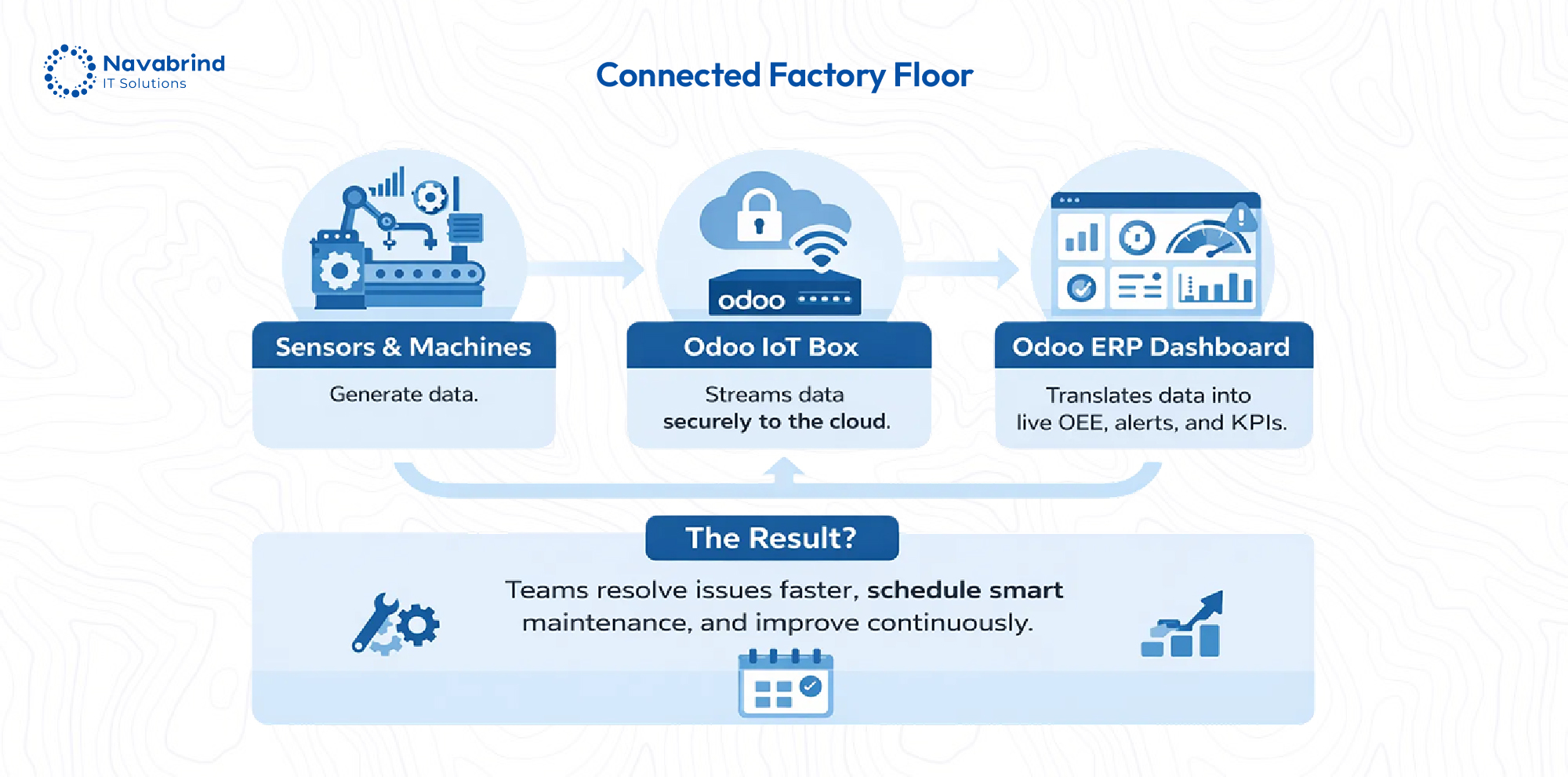How to Migrate from an DDI ERP to a Robust Odoo ERP System
- May 2, 2025
- Posted by: Venkadesh Nagarajan
- Categories: Blog, ERP Migration
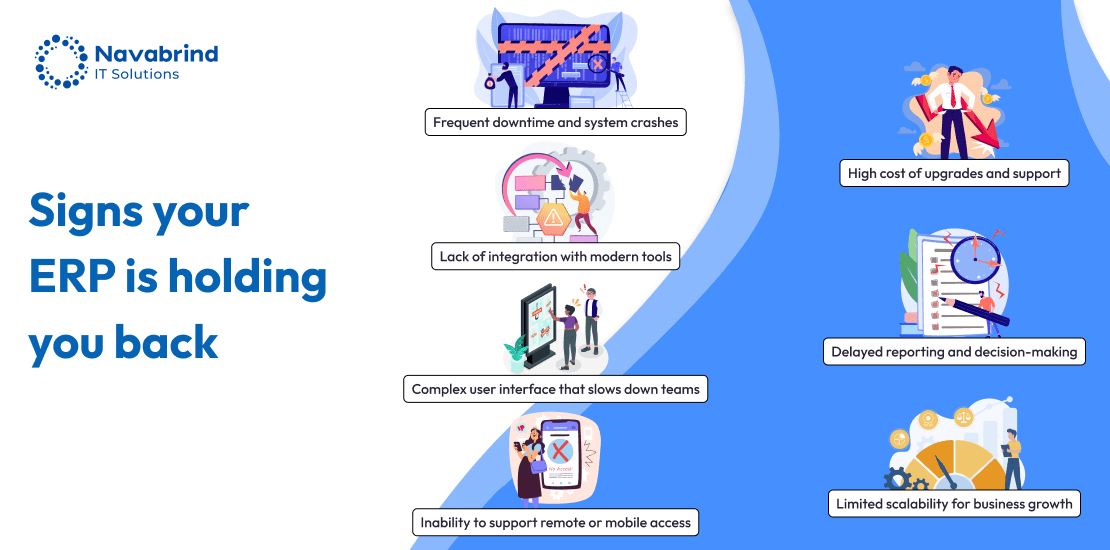
DDI ERP vs Odoo ERP — Making the Rich Choice
For distributors operating in highly competitive markets, the right ERP system is critical to success. From managing inventory and customer relationships to streamlining procurement and sales, a robust ERP platform serves as the digital backbone of the organization. But not all ERP systems are created equal—especially when it comes to scalability, integration, and long-term value.
Many distribution businesses that have relied on legacy platforms like DDI System ERP are beginning to feel the strain. While there are distinct benefits of DDI ERP—such as its focus on distribution-centric features and ease of use—its limitations in modern integration capabilities, UI flexibility, and customization options are increasingly evident. This has led to companies evaluating the DDI ERP vs Odoo ERP debate more seriously.
Odoo ERP has emerged as a powerful and scalable alternative. With its modular architecture, modern interface, and array of built-in applications—ranging from inventory and accounting to multi warehouse management and e-commerce—Odoo offers a level of flexibility, AI, support, and continuous upgrades that legacy systems struggle to match. These Odoo ERP features make it an ideal solution for distributors looking to future-proof their operations.
This blog explores the core question: Is Odoo ERP a viable alternative to DDI System ERP for distributors? We’ll provide a detailed comparison of DDI System ERP and Odoo ERP, assess how DDI ERP stacks up against Odoo ERP in functionality and pricing, and offer a roadmap for switching from DDI ERP to Odoo ERP with minimal disruption. If you’re considering a change, this ERP comparison: DDI vs Odoo will help you make an informed decision grounded in business value and operational efficiency.
Understanding DDI System ERP
DDI System is a specialized enterprise resource planning solution designed primarily for wholesale distributors. With a focus on inventory-centric businesses, DDI ERP offers functionality tailored to the needs of supply chain, distribution, and order management. Built to support daily operations such as quoting, order entry, purchasing, and accounting, DDI aims to streamline the back-office complexities of distribution businesses.
Key Features and Target Audience
At its core, DDI System ERP provides features like:
- Inventory management and purchasing automation
- Sales order processing and pricing optimization
- Integrated accounting and financial reporting
- Customer relationship management (CRM)
- Rebate tracking and vendor performance analytics
These capabilities make it suitable for small to mid-sized wholesale distributors looking for an out-of-the-box ERP solution with minimal customization needs.
Where DDI Delivers Value - and Where It May Fall Short
While DDI ERP delivers value in standard distribution environments, many businesses are exploring modern alternatives due to limitations in scalability, flexibility, and third-party integrations. As customer expectations evolve and digital commerce accelerates, legacy systems like DDI struggle to keep up with real-time demand forecasting, omnichannel selling, and cloud-native capabilities.
This is where the ERP comparison: DDI vs Odoo becomes essential. Odoo’s modular, open-source architecture and wide array of features—ranging from advanced CRM to integrated eCommerce, multi warehousing, logistics, supply chain, manufacturing, HR, business intelligence, and more—position it as an adaptable and future-ready system.
When asking, how does DDI stack up against Odoo ERP in functionality and pricing?, many distributors find that while DDI is suitable for traditional use cases, Odoo ERP excels in offering a broader, customizable solution that can grow alongside the business.
So, is Odoo ERP a viable alternative to DDI System ERP for distributors? For many, especially those seeking digital transformation, workflow automation, and long-term scalability, the answer is increasingly yes.
Odoo ERP - Scalable, Open-Source Cost-Effective Alternative to DDI System
Odoo ERP is a modern, open-source solution designed to unify business processes into a single, customizable platform. Unlike traditional ERP systems that require heavy customization and siloed integrations, Odoo stands out for its modular architecture, which allows businesses to implement only the features they need and scale as they grow.
With an increasing number of core modules and thousands of community-developed apps, Odoo offers an all-in-one solution for mid-sized and large distributors seeking efficiency, flexibility, and automation.
Core Strengths of Odoo ERP
At the heart of Odoo’s popularity lies its ability to eliminate operational silos. Its modular design ensures that all functions—from inventory and purchasing to sales and customer service—are connected. This architecture enables distributors to avoid the integration challenges seen in legacy systems like DDI.
When evaluating DDI ERP vs Odoo ERP, distributors often find that Odoo provides more agility in adapting to changing business models and customer demands. Its user-friendly interface, built-in analytics, and robust customization capabilities make it a highly competitive ERP option.
Key Odoo ERP Features for Distributors
For distributors, Odoo ERP features offer comprehensive support across the value chain. Some of the most impactful capabilities include:
- Inventory Management: Real-time tracking, automated reordering, barcode scanning, and multi-warehouse support.
- Accounting: Integrated invoicing, bank reconciliation, tax management, and compliance tools.
- CRM: Sales pipeline visibility, activity tracking, and lead nurturing.
- E-Commerce Integration: Native tools to build and manage online storefronts and synchronize them with backend operations.
- Third-Party Integrations: Seamless integration with shipping carriers, payment gateways, and marketplaces.
These features address common gaps in legacy systems, making switching from DDI System to Odoo ERP a compelling option for forward-looking distributors.
Why Odoo Is Gaining Ground Among Distributors
Odoo is gaining momentum among mid-sized and large distributors due to its cost-effectiveness, scalability, and rich functionality. As organizations reevaluate their tech stacks, many are asking: How does DDI ERP stack up against Odoo ERP in functionality and pricing? The answer often reveals Odoo’s superior flexibility, faster deployment, and lower total cost of ownership.
While there are benefits of DDI ERP-particularly its tailored features for distribution-Odoo provides a future-ready foundation that supports deep customization, and innovation.
DDI ERP vs Odoo ERP - A Comparison
For distributors evaluating a system upgrade, a side-by-side view of the two platforms—DDI System ERP and Odoo ERP—offers clarity on what each solution delivers. While the benefits of DDI ERP are well-established for traditional wholesale distribution workflows, modern organizations increasingly seek adaptability, integration, and end-to-end process automation.
This detailed comparison of DDI System ERP and Odoo ERP outlines how these two platforms measure up across essential categories. It also addresses the question many distributors are asking: How does DDI ERP stack up against Odoo ERP in functionality and pricing?
Below is a comparative breakdown:
|
Criteria |
DDI System ERP |
Odoo ERP |
|
Core Features |
Inventory control, sales order management, accounting, CRM |
Inventory, CRM, sales, accounting, project management, manufacturing, eCommerce, HR, marketing, and more |
|
Scalability |
Limited scalability for growing businesses |
Highly scalable modular system suitable for SMEs to large enterprises |
|
Integration Capabilities |
Basic integrations with limited third-party support |
Extensive API support, third-party app integrations, native connectors to platforms like Shopify, Magento, and others |
|
User Interface & Experience |
Traditional UI; function-focused |
Modern, intuitive UI with customizable dashboards and mobile responsiveness |
|
Flexibility |
Fixed workflows, limited deviation |
Fully modular and adaptable to any business process |
|
Customization |
Low customization without heavy vendor involvement |
High flexibility; easy to customize through Odoo Studio or developer support |
|
Pricing Transparency & TCO |
Tiered pricing, opaque TCO due to support and upgrade fees |
Transparent, pay-as-you-grow model with predictable total cost of ownership |
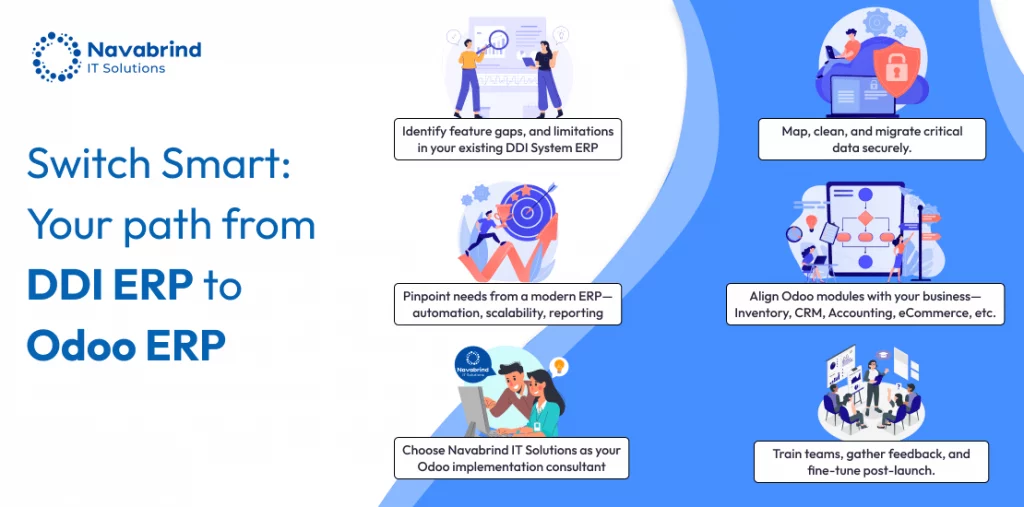
Is Odoo ERP a Viable Alternative to DDI System ERP for Distributors?
For distributors navigating complex supply chains, evolving customer expectations, and expanding product catalogs, the ERP they choose plays a pivotal role in operational success. The question many ask: Is Odoo ERP a viable alternative to DDI System ERP for distributors?
The answer is increasingly yes—especially for businesses prioritizing scalability, customization, and long-term cost efficiency.
Addressing Industry-Specific Needs
Odoo ERP caters to the nuanced demands of distributors with a wide range of built-in functionalities:
- Inventory Management with multi-warehouse tracking, batch/serial number traceability, and reorder automation
- Sales and Purchase Automation with smart rules, vendor management, and margin insights
- CRM and Customer Portals for better service delivery and client engagement
- Accounting and Invoicing fully integrated into core operations
- Third-party integrations (e.g., shipping carriers, e-commerce platforms, EDI, payment gateways)
These Odoo ERP features deliver an operational ecosystem that aligns well with the real-world needs of distribution businesses. In contrast, DDI System often lacks the modular extensibility and integration readiness required to compete in fast-evolving digital marketplaces.
Transition Benefits: Why Switching from DDI to Odoo ERP Makes Sense
- Cloud-Native Environment
Odoo offers cloud-hosted and on-premise deployment options, enabling flexibility and remote access. This is particularly beneficial for distributors with geographically distributed operations or field teams. - Real-Time Reporting and Analytics
Unlike the often batch-processed or limited dashboards found in legacy systems, Odoo provides real-time KPIs, inventory movement tracking, sales performance analytics, and customizable dashboards—fueling informed, data-driven decisions. - Superior Third-Party Integration
Odoo’s open API architecture supports seamless integration with platforms such as Shopify, Magento, FedEx, QuickBooks, and CAD tools. Compared to DDI ERP, which often requires vendor-specific connectors or workarounds, Odoo provides better interoperability and automation potential.
Real-World Metrics from Odoo Implementations
Distributors that have adopted Odoo have reported:
- 30–50% improvement in order processing speed
- Up to 60% reduction in inventory holding costs
- Greater agility in adding new SKUs, managing seasonal spikes, and integrating sales channels
While the benefits of DDI ERP remain valid for small distributors with static requirements, larger or growing distributors often find its architecture limiting.
Steps to Migrate from DDI ERP to Odoo ERP
Migrating from a legacy system like DDI System ERP to a modern platform such as Odoo ERP requires strategic planning, technical expertise, and a deep understanding of your business processes. While the benefits of DDI ERP are notable—particularly for wholesale distributors—many businesses are now evaluating the DDI ERP vs Odoo ERP debate and choosing to make the switch to leverage advanced features, improved scalability, and lower total cost of ownership.
Below is a structured approach to help distributors successfully manage the transition.
1. Pre-Migration Planning: Audit Existing Processes
Before making any changes, it’s essential to assess your current system. Identify pain points in your DDI System ERP—such as outdated interfaces, limited integration, or lack of customization—and map all workflows. This audit will serve as the foundation for your ERP comparison: DDI vs Odoo, ensuring you capture what’s working and what’s not.
2. Choosing the Right Odoo Implementation Partner
The success of switching from DDI ERP to Odoo ERP heavily depends on your technology partner. Choose a provider with deep expertise in Odoo ERP features, module customization, and industry-specific experience. A seasoned partner like Navabrind IT Solutions can guide you through the detailed comparison of DDI System ERP and Odoo ERP, helping you maximize return on investment.
3. Data Migration Best Practices
One of the most critical aspects of migration is clean, secure, and accurate data transfer. Historical sales data, inventory, customer records, vendor information, and BOMs must be validated before migration. Unlike DDI System ERP, Odoo offers advanced data import tools and templates to streamline this process.
4. Module Mapping and Customization
Odoo’s modular architecture allows businesses to select only the features they need—such as Inventory, Accounting, CRM, and eCommerce—and customize them. Evaluate which modules in Odoo ERP align with those in DDI System ERP and identify gaps. The flexibility of Odoo makes it an attractive solution when analyzing how DDI ERP stacks up against Odoo ERP in functionality and pricing.
5. User Training and Change Management
Your team’s ability to adapt is crucial. While DDI System ERP may have entrenched workflows, Odoo’s intuitive UI and modern UX require hands-on training for a smoother transition. Implement phased onboarding, offer role-based tutorials, and designate internal champions to manage the cultural shift. Besides supporting you with the Odoo ERP implementation, Navabrind IT Solutions will also offer your team detailed hands-on training.
6. Post-Migration Support
After going live, it’s essential to continue monitoring system performance and user adoption. Issues related to customization, performance tuning, and reporting will need timely resolution. A good Odoo partner like Navabrind IT Solutions offers ongoing support and optimization, ensuring that Odoo ERP continues to deliver long-term value.
Navabrind IT Solutions: Your Migration Partner from DDI System to Odoo ERP
Thinking about switching from DDI ERP to Odoo ERP? Let Navabrind IT Solutions be your trusted partner. We specialize in seamless ERP transitions and understand the unique operational needs of distributors. Our team helps you navigate the complexities of migration with a focus on process mapping, data migration, and module configuration aligned to your business goals. Our end-to-end services include consulting, implementation, customization, data migration, upgradation, training, support, and maintenance.
With a deep understanding of the ERP comparison: DDI vs Odoo, we perform a detailed comparison of DDI System ERP and Odoo ERP based on your requirements. We help you evaluate gaps in customization, UI/UX, third-party integration, and total cost of ownership. Unlike many legacy systems, Odoo ERP features, such as, modular flexibility, cloud readiness, and advanced automation—enable you to scale without unnecessary complexity.
So, is Odoo ERP a viable alternative to DDI System ERP for distributors? Absolutely. Navabrind IT Solutions has helped several clients successfully migrate from rigid systems to Odoo’s dynamic platform. From pre-migration assessments to post-implementation support, we offer end-to-end guidance for switching from DDI ERP to Odoo ERP. Our goal is to not just replace your system—but to transform your operations, reduce cost, and drive long-term efficiency through tailored Odoo solutions.
Frequently Asked Questions
1. Key Differences Between DDI System and Odoo ERP in Features and Scalability
When comparing DDI System vs Odoo ERP, one of the primary distinctions lies in their core functionalities. DDI System is tailored for distributors and manufacturers, offering robust inventory management, procurement, and order fulfillment features. In contrast, Odoo ERP features span a broader range, including CRM, eCommerce, project management, and HR modules, making it a more versatile, all-in-one solution. While DDI ERP excels in niche distribution workflows, Odoo ERP provides greater flexibility with its modular approach, allowing businesses to scale by adding apps as needed.
Scalability is another critical factor in the ERP comparison: DDI vs Odoo. DDI System ERP is designed for mid-sized distributors with complex supply chain needs but may lack the agility for rapid expansion into new markets or industries. Odoo ERP is highly scalable, supporting businesses from startups to large enterprises due to its open-source foundation and cloud-based deployment options. This makes Odoo ERP a stronger choice for companies anticipating growth or diversification.
DDI ERP follows a traditional licensing model, which can be cost-prohibitive for smaller businesses, whereas Odoo ERP offers a freemium model with affordable modular pricing. Odoo’s extensive marketplace for third-party integrations provides an edge over DDI ERP’s more rigid ecosystem. For businesses evaluating both ERPs, Odoo emerges as the more adaptable and cost-effective solution.
2. Migrating Historical Data from DDI ERP to Odoo ERP
Yes, you can migrate your historical data—including customer, vendor, and transaction records—when switching from DDI ERP to Odoo ERP. However, the process requires planning due to differences in database structures between the two systems. DDI System stores data in a proprietary format, whereas Odoo ERP uses PostgreSQL, meaning data extraction, transformation, and loading (ETL) may be necessary. Many businesses use middleware or specialized migration tools to ensure a smooth transition while preserving data integrity.
The benefits of DDI ERP, such as its specialized distribution tracking, may not have direct equivalents in Odoo ERP features, so mapping fields accurately is crucial. For example, customer purchase histories or vendor lead times in DDI ERP must be aligned with Odoo’s corresponding modules. Fortunately, Odoo ERP’s flexible API and customization options simplify this process, allowing businesses to retain critical historical records without significant data loss.
While Odoo ERP may lack some niche distribution features found in DDI ERP, its modularity and scalability often compensate. Companies should conduct a trial migration to identify gaps and leverage Odoo’s extensive support community for assistance. Ultimately, with proper execution, Odoo ERP can serve as a powerful replacement for DDI System ERP, especially for businesses seeking a more flexible and scalable solution.
3. How Does DDI ERP Stack Up Against Odoo ERP in Pricing, Ongoing Costs, and Total Cost of Ownership?
DDI System typically follows a traditional perpetual licensing model, requiring a substantial upfront investment in software licenses, implementation, and customization. Ongoing costs include annual maintenance fees, support contracts, and potential upgrade expenses. In contrast, Odoo ERP features a more flexible pricing structure, offering both a free open-source version and a modular subscription-based model for enterprise users. This makes Odoo ERP more accessible for small to mid-sized businesses, with lower initial costs and predictable monthly payments.
The ERP comparison: DDI vs Odoo in ongoing costs reveals further distinctions. DDI ERP may involve higher IT infrastructure expenses if deployed on-premise, including server maintenance and IT staffing. Meanwhile, Odoo ERP provides cloud-based deployment options, reducing hardware costs and IT overhead. Odoo’s modular approach allows businesses to pay only for the features they need, whereas DDI ERP’s bundled pricing may include unnecessary functionalities, increasing total cost of ownership (TCO).
DDI ERP excels in specialized distribution workflows (a key benefit of DDI ERP), its higher long-term costs can be a drawback for growing businesses. Odoo ERP, with its scalability and lower operational expenses, often presents a more cost-effective solution. For companies assessing how DDI ERP stacks up against Odoo ERP in functionality and pricing, Odoo frequently emerges as the better choice for those prioritizing affordability and flexibility.
4. What Are the Steps Involved in Switching from DDI ERP to Odoo ERP, and How Long Does Migration Typically Take?
Switching from DDI to Odoo ERP involves a structured migration process to ensure data accuracy and system functionality. The first step is a detailed comparison of DDI System ERP and Odoo ERP to identify feature gaps and data mapping requirements. Businesses must extract data from DDI ERP (e.g., customer records, vendor details, transaction history) and transform it into a format compatible with Odoo ERP’s PostgreSQL database. Data cleansing is critical at this stage to eliminate redundancies and outdated entries.
The migration moves to system configuration and testing. Odoo ERP features must be customized to replicate or improve upon DDI ERP’s workflows, particularly for distributors. This includes setting up inventory rules, procurement processes, and financial reporting structures. A pilot migration is recommended to validate data integrity before full deployment. Depending on the complexity, this phase can take several weeks to months, with larger enterprises requiring more time for thorough testing and user training.
The final step is go-live and post-migration support. Companies often run parallel systems temporarily to ensure a smooth transition. The entire process typically takes 3 to 6 months, though simpler deployments may finish sooner. For distributors questioning, Is Odoo ERP a viable alternative to DDI System ERP?, the answer is yes—provided the migration is well-planned. While DDI offers deep distribution expertise, Odoo ERP’s flexibility, lower TCO, and scalability make it a strong contender.
5. Is Odoo ERP a Viable Alternative to DDI System ERP for Distribution Businesses with Complex Needs?
When evaluating DDI ERP vs Odoo ERP for distribution businesses with complex order and inventory management, Odoo ERP proves to be a strong contender. While DDI System is purpose-built for distributors—offering deep functionality in procurement, warehouse management, and demand forecasting—Odoo ERP features provide comparable capabilities through its Inventory, Sales, and Purchase modules, enhanced by a vast library of third-party apps. For businesses with highly specialized workflows, Odoo’s flexibility allows customization to meet unique requirements, making it a scalable alternative to DDI ERP.
A detailed comparison of DDI System ERP and Odoo ERP reveals that DDI ERP excels in out-of-the-box distribution logic, such as lot tracking and multi-location inventory management—key benefits of DDI ERP. However, Odoo ERP compensates with superior integration capabilities, real-time analytics, and a modern user interface, which can streamline operations for growing distributors. The ERP comparison: DDI vs Odoo also highlights Odoo’s cost advantage, as its modular pricing allows businesses to pay only for the features they need, unlike DDI ERP’s traditional licensing model.
Ultimately, Odoo ERP is a viable alternative to DDI System ERP for distributors, particularly those prioritizing adaptability and long-term scalability. While DDI ERP may still be preferable for businesses with extremely niche distribution needs, Odoo’s extensive customization options, lower total cost of ownership, and continuous innovation make it a compelling choice for companies considering switching from DDI ERP to Odoo ERP.
6. What Challenges Should I Expect During Migration, and How Can Navabrind IT Solutions Help?
Switching from DDI ERP to Odoo ERP presents several challenges, primarily around data migration and system adaptation. Since DDI System ERP and Odoo ERP use different database architectures, transferring historical data—such as customer records, vendor details, and transaction histories—requires meticulous extraction, transformation, and loading (ETL). Additionally, businesses may face workflow discrepancies, as Odoo ERP features may not perfectly mirror DDI ERP’s distribution-specific processes, necessitating customization.
Another hurdle in the ERP comparison: DDI vs Odoo is user adoption. Employees accustomed to DDI ERP’s interface and workflows may resist transitioning to Odoo ERP, requiring comprehensive training and change management. Data integrity risks during migration, such as incomplete or mismatched records, can also disrupt operations if not addressed early. This is where an experienced consulting partner like Navabrind IT Solutions becomes invaluable. With expertise in DDI ERP vs Odoo ERP migrations, Navabrind IT Solutions can streamline data mapping, automate ETL processes, and configure Odoo ERP to replicate critical DDI ERP functionalities while minimizing downtime.
Navabrind IT Solution’s support extends beyond technical execution—they help businesses conduct a detailed comparison of DDI System ERP and Odoo ERP to identify gaps and optimize the new system. From initial planning to post-migration troubleshooting, their guidance ensures a smooth transition, reducing risks and accelerating ROI. For distributors asking, Is Odoo ERP a viable alternative to DDI System ERP?, partnering with Navabrind IT Solutions can make the difference between a disruptive switch and a seamless upgrade. Their expertise ensures that Odoo ERP not only replaces DDI ERP but enhances operational efficiency for long-term success.
Schedule a conversation with us now!
Related Articles
-
Post
Odoo ERP for the Retail Industry: Driving Efficiency and Growth
Odoo ERP for the Retail Industry: Driving Efficiency and Growth February 27, 2026 Posted by: Vasanth Anantharaman Categories: Blog, Odoo for Retail industry No Comments Why the Retail Industry Runs Better on Odoo ERP Retail runs on dozens of disconnected apps. One tool for sales, another for stock, a third for loyalty. None speak to -
Post
From Formula to Forecast: Odoo’s Transformative Edge in Chemical Manufacturing
From Formula to Forecast: Odoo’s Transformative Edge in Chemical Manufacturing February 27, 2026 Posted by: Jaishree Jayabal Singh Categories: Blog, Odoo ERP for Chemical Industry No Comments Odoo ERP for Chemical Industry Solves the Disconnection Problem Chemical manufacturing operates across multiple fronts, production floors, warehouse storage, laboratory testing, and regulatory reporting. Managing these as isolated -
Post
How Odoo ERP Helps Manufacturers Track Machine Efficiency and Move Toward Industry 4.0
How Odoo ERP Helps Manufacturers Track Machine Efficiency and Move Toward Industry 4.0 February 25, 2026 Posted by: Venkadesh Nagarajan Category: Uncategorized No Comments The Shift Toward Smart Manufacturing Machine efficiency is the core of manufacturing. Without it, cost control and scalability are impossible. Industry 4.0 accelerates this, merging IoT and data analytics to drive
written by

Venkadesh Nagarajan
Venkatesh Nagarajan is the Founder and Chief Technology Officer at Navabrind IT Solutions, where he oversees digitalization, solution design, and automation for hundreds of customers. He is responsible for implementing the company’s full portfolio of solutions on platforms such as Odoo, Magento, Akeneo, and OdooPIM. As a techno‑functional consultant, he excels at understanding clients’ business needs and designing tailored solutions that deliver significant business value. He ensures that every client engagement is executed using industry best practices, with a focus on personalization, innovation, and adherence to budget and timelines. Venkatesh leads a team of highly skilled solution architects, developers, and project managers who are engaged in implementing, integrating, customizing, maintaining, and supporting clients across industries, including e‑commerce, retail, automotive, electronics, manufacturing, engineering, healthcare, IT and BPM, real estate, and textiles.
How can we help you?
Get in touch with a solutions consultant that can share best practices and help solve specific challenges.







